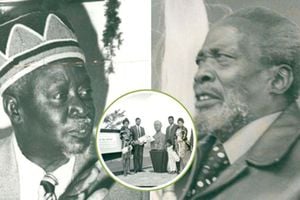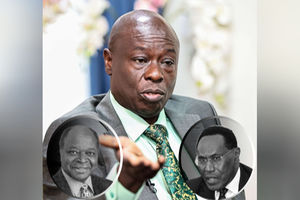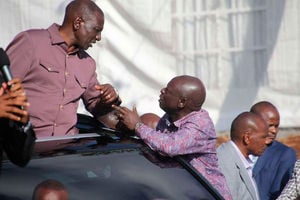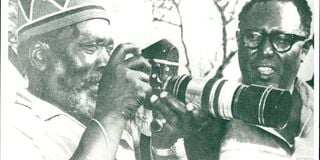
Mzee Jomo Kenyatta (left) with the then Vice President Joseph Murumbi.
Jaramogi Oginga Odinga’s resignation as Jomo Kenyatta’s vice-president in 1966 was hardly unexpected. What caught all off guard was Kenyatta’s decision to appoint Joseph Zuzarte Murumbi as a potential successor.
Yet, within just two months of assuming the role, Murumbi was already contemplating his exit.
Murumbi was also surprised by his appointment: “I didn’t know I was being appointed to replace Odinga as Vice-President. I was never consulted. I was at a Cabinet meeting when it was announced that I was the next vice-president,” he later said.
“I was highly flattered, and to make matters even better, the President organised a little luncheon for me, in honour of the occasion, after the Cabinet meeting.”
Murumbi would later think that his elevation was meant to ease the British and American fears that Kenyatta’s Foreign Affairs Minister was too radical for their liking.
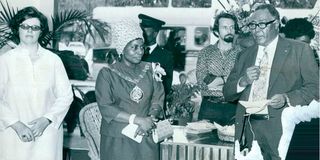
Vice President Joseph Murumbi (right) with Mayor of Nairobi Margaret Kenyatta (centre) and other guests during the official opening of African Heritage Ltd in Nairobi on January 31, 1973.
In a published interview in Rothmyer Karen’s Joseph Murumbi: A Legacy, he is quoted saying: “I think I was getting a bit too controversial in my handling of foreign policy, which was not the liking of the Americans and the British. And I think certain pressures were put on the Old Man to get rid of me as Foreign Minister, and the Old Man thought of the brilliant idea of kicking me upstairs. This is what I just surmise, I have no clear proof.”
As vice president and MP, Murumbi grew increasingly troubled by the rampant corruption, feeling trapped in a broken system.
He lamented the failure to fulfil the promises made at independence, especially in addressing the plight of the landless. Two years earlier, he had lost his confidant, Pio Gama Pinto, to an assassin’s bullet.
He also witnessed the vicious political campaign against Jaramogi, which culminated in the Limuru Conference; a meeting Murumbi chose to avoid. As vice president, he knew he was next in line as a target in the succession struggle.
In July 1966, Murumbi drafted a resignation letter to Kenyatta, citing ill health, but he hesitated and kept it in his file.
A copy of the letter, now part of the Murumbi archives, was sent to his business associate Taj Nanji, an executive at the African Cigarette Company. Nanji, however, removed the “ill-health” reference and returned it to Murumbi.
It appears Murumbi was on the horns of a dilemma. He drafted another letter to the president, which he again never sent.
The original reads: “I have for the past year contemplated leaving politics altogether. This is because I feel my health does not permit me to continue with the strenuous duties of a minister. I, therefore, now wish to inform you that I would be grateful if you could release me from the position of vice-president as at the end of August 1966.”
“I hope you will understand my position and that my withdrawal from active politics, including membership of Parliament, is mainly for health reasons. I wish to thank you for your confidence in me during the three years I have served you and ensure you that, even though I will not be in politics, I will continue to give support to you and your government.”
Before he wrote the letter, according to a note sent to Nanji, Murumbi met Kenyatta at State House.
Kenyatta asked him to hold on until the end of September since the “President will be away in Mombasa under doctor’s orders for the whole of August and he wishes me to lead the Kenyan delegation to the Commonwealth Prime Ministers’ Conference from September 6 until September 19.”
Finally, on August 15, Murumbi officially informed Kenyatta of his intention to step down by the end of September. He had dropped his intention to quit as MP. He told Kenyatta that he had been offered the chairmanship of Rothmans of Pall Mall (K) Ltd, an international company “that is starting a tobacco industry here on a 50-50 partnership.”
He told Kenyatta this was a “unique opportunity since the chairmanship is for life and it will be the first time that an international company of the standing of Pall Mall has offered the chairmanship to an African. I regret that I have had to take this step but I have my future to consider.”
Whether Murumbi knew that the company was also negotiating with British American Tobacco for a merger is not clear – but soon after he resigned and joined Rothmans, it was acquired by BAT.
Murumbi’s intended resignation jolted Kenyatta’s inner circle. On the morning of September 20, 1966, while attending a UN General Assembly meeting in New York, he received a telex from Duncan Ndegwa, the Secretary to the Cabinet.
Already, it was known that Murumbi intended to quit and he feared that the foreign media might use his resignation to portray Kenyatta’s government as weak.
Ndegwa said in the telex: “In view of the mounting speculation and newspaper reports, the following statement was issued today. I am asked to convey it to you with the information that this will be the official line.”
The “official line” adopted by the Kenyatta insiders was that Murumbi was ailing and that was why he had opted to quit.
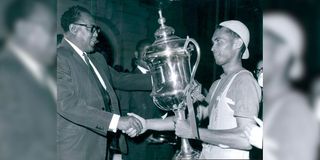
Vice President Joseph Murumbi present a trophy to motor rally champion Philip Baptiste.
In the statement that he sent to Murumbi, Ndegwa said that before Murumbi left for the Commonwealth and the UN General Assembly, he had “informed the president that the strain of continuing poor health was making it physically difficult for him to perform to the satisfaction of his own high standards the onerous official and social duties attached to his office.”
Ndegwa had told the media, without Murumbi’s approval, that Kenyatta “sympathised with Murumbi’s position and agreed to consider his request when he returned from his assignment as leader of Kenya’s government delegation.”
Murumbi called Kenyatta and demanded a retraction.
For two years, the death of Pio Gama Pinto had bothered him. Murumbi was the godfather of Pinto’s youngest daughter, Tereshka, and had hoped that he could convince Kenyatta to set up a commission of inquiry to investigate the assassination.
But Kenyatta said that the matter had been dealt with by courts. On January 24, 1967, in a letter to Paul Morawetz of ANZ Bank, Murumbi explained his resignation.
“I have resigned but not for health reasons. This was a mess-up by the Permanent Secretary in the President’s Office, and it was corrected. I have discussed this matter with you several times and informed you of my desire to leave politics.”
In another letter to Ted Bedford of International PR Company, Murumbi said he found his new vocation as an executive “much better than politics, which nearly ruined my health.”
Regarded as one of the few sober politicians in Kenya, Murumbi refused to play in the dirty politics of the 1960s. On the day he went to bid Kenyatta farewell, Charles Njonjo – the Attorney General – mocked him: “You are finished, Joe.”
The CIA had always regarded Murumbi as urbane, intelligent and articulate. But they feared he belonged to the radical Pan-African wing that was anti-West.
According to former President Daniel Moi, Murumbi, was “a reluctant successor to Odinga” and “was appalled at the way the Kikuyu elite were voraciously lining their pockets at the expense of the nation”.
Kenyatta, however, respected Murumbi’s candour. In 1963, when Kenyatta asked him to reorganise the Kanu headquarters, which was split between Tom Mboya and Jaramogi, Murumbi expressed frustration.
“I will not sit in an empty office and be expected to perform miracles. To date, I have not received a penny for reorganisation. I sincerely appreciate the confidence you have in me and it was my intention to do all in my power to see that the headquarters functioned efficiently,” he wrote to Kenyatta in a secret note dated February 13, 1964.
“I am disappointed with you personally, the (Kanu) vice-president (Oginga Odinga) and Mr Mboya as you all exhibit no desire, particularly when we are faced with an election, to see that the headquarters functioned efficiently.”
Murumbi’s resignation gave Kenyatta a chance to appoint his third vice-president, Moi.
Tomorrow:How Moi survived the Turbulence for 12 years

